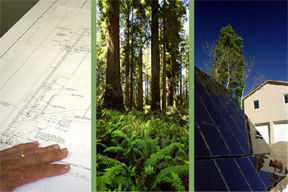Green Design: Introduction to Sustainable Water Systems I (Based on LEED 2009)
At the conclusion of this course you will be able to:
- Discuss both larger watershed and community water systems local sites support
- Explain the impact of local development practices on water systems, local water resource reserves, and water quality
- Identify the cultural, social, economic, and health benefits communities derive from earth’s water systems
- Predict consequences of the conflicts between current development practices and these water systems
- Recognize emerging developments practices that work better with, and have a lower-impact on watershed systems
- Describe the LEED WE rating system
- Discuss low-impact practices that support water conservation, recycling, harvesting, and stormwater management – and help meet the LEED WE rating
- Recall examples of how these practices provide opportunities to express natural, cultural, social, and aesthetic character of place

Tracy Walker Moir-McClean received her BA and M. Arch from the University of Michigan. Following practice in the cities of Denver, Baltimore, and Ann Arbor she transitioned to an academic career, joining the faculty of University of Tennessee in 1991. Her research explores conceptual interaction between cultural landscape, nature, and region, with recognition of the co-existence and interaction of human and extra-human aspects of landscape and environment. Urban, suburban, pastoral, and wild contexts are considered, as is the possibility that aspects of the aforementioned contexts easily co-exist on the same site. In the College, Prof. Moir-McClean coordinates and teaches the 5th year self-directed project sequence. In addition, she offers seminar courses that explores ethical and philosophical positions related to her research interests. Recent publications include the article: Observations of Faith: Cultural Landscape Context in Design Education included in the anthology: Everyday America: J.B. Jackson and New Work in Cultural Landscape Studies, University of California Press.

